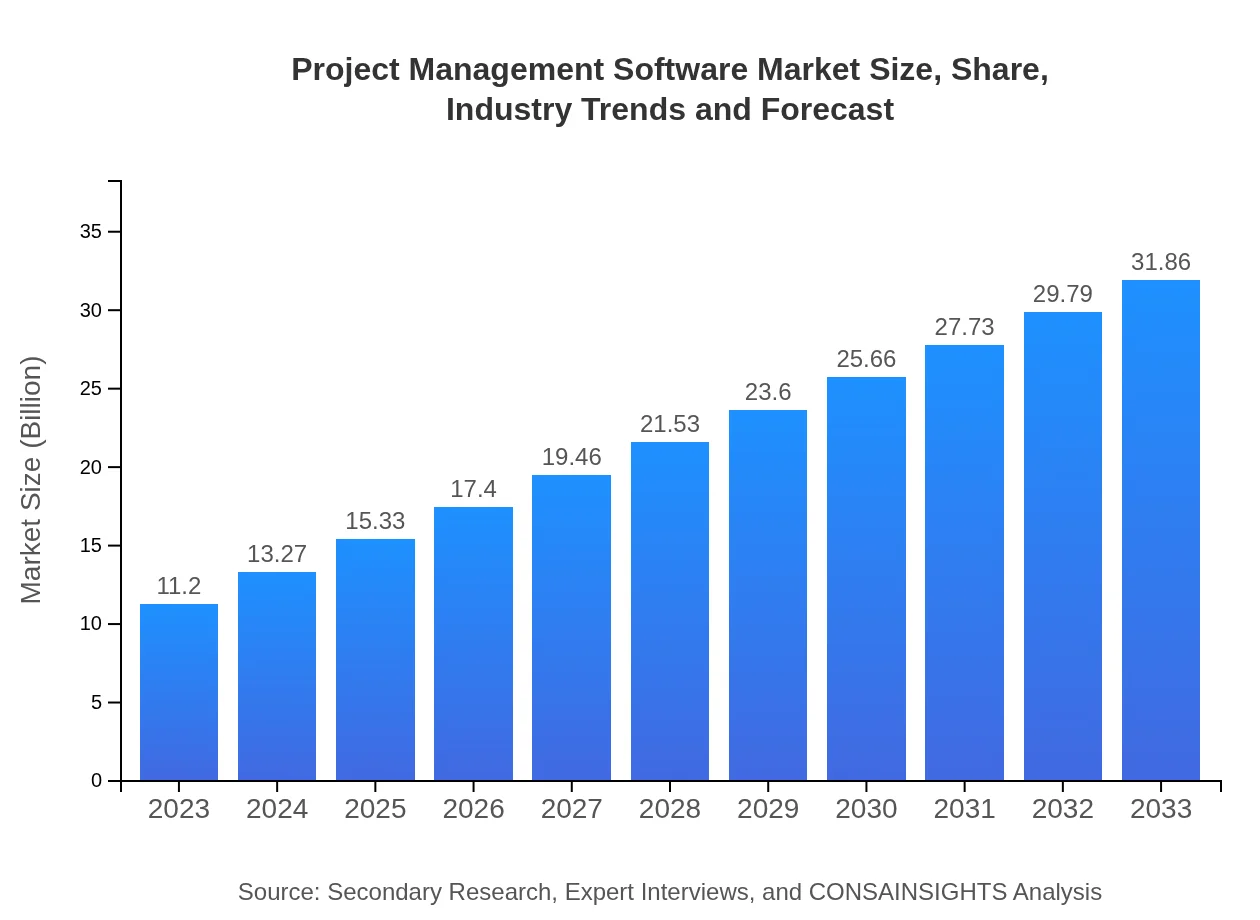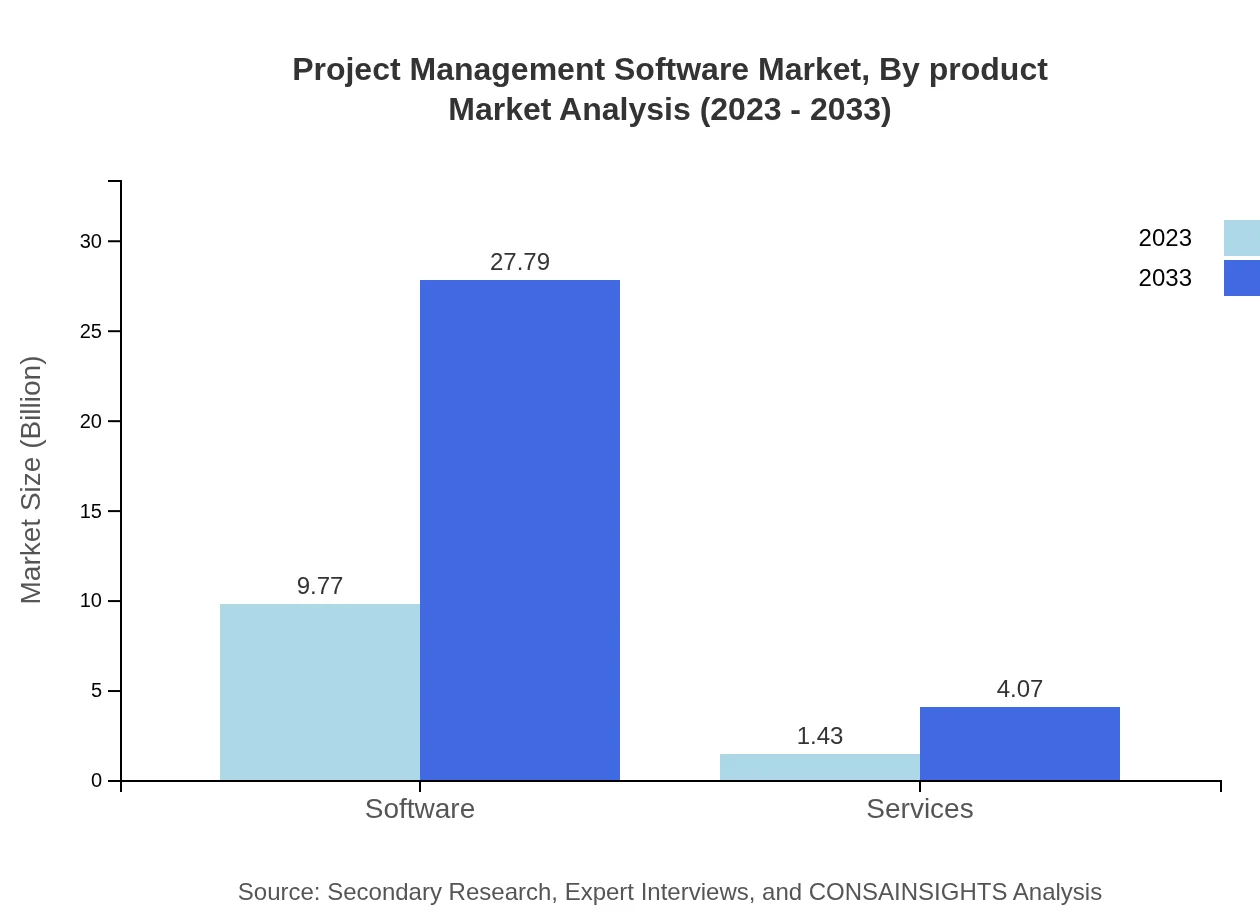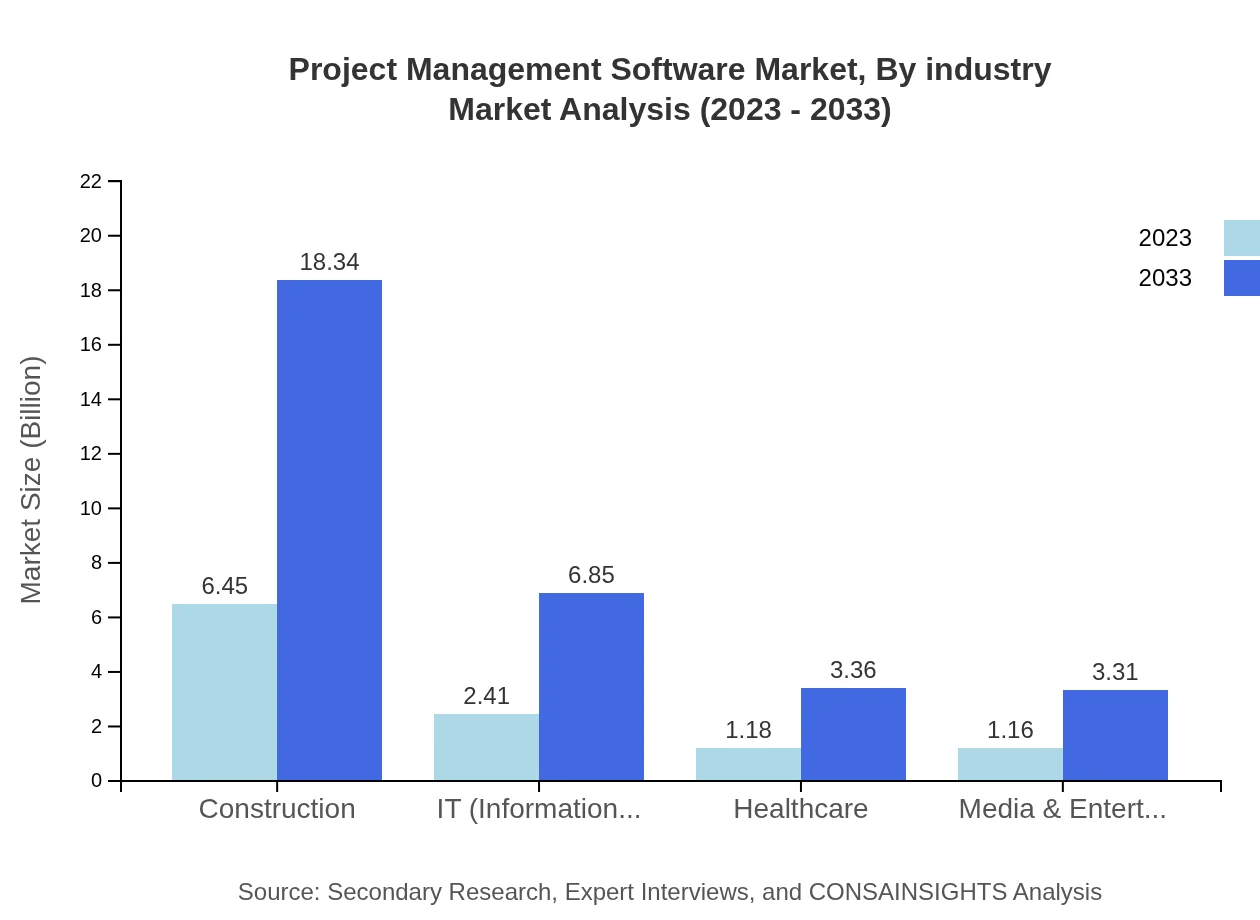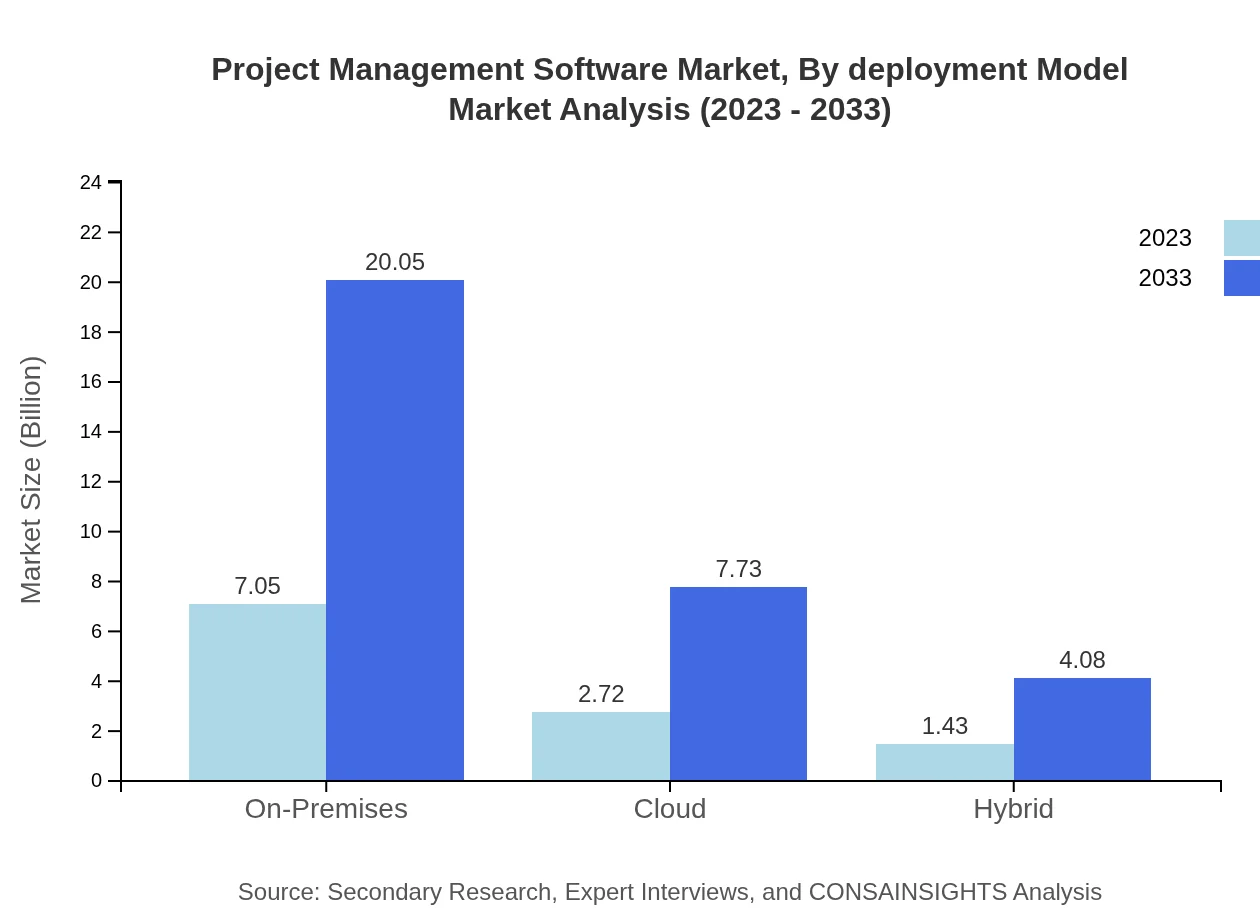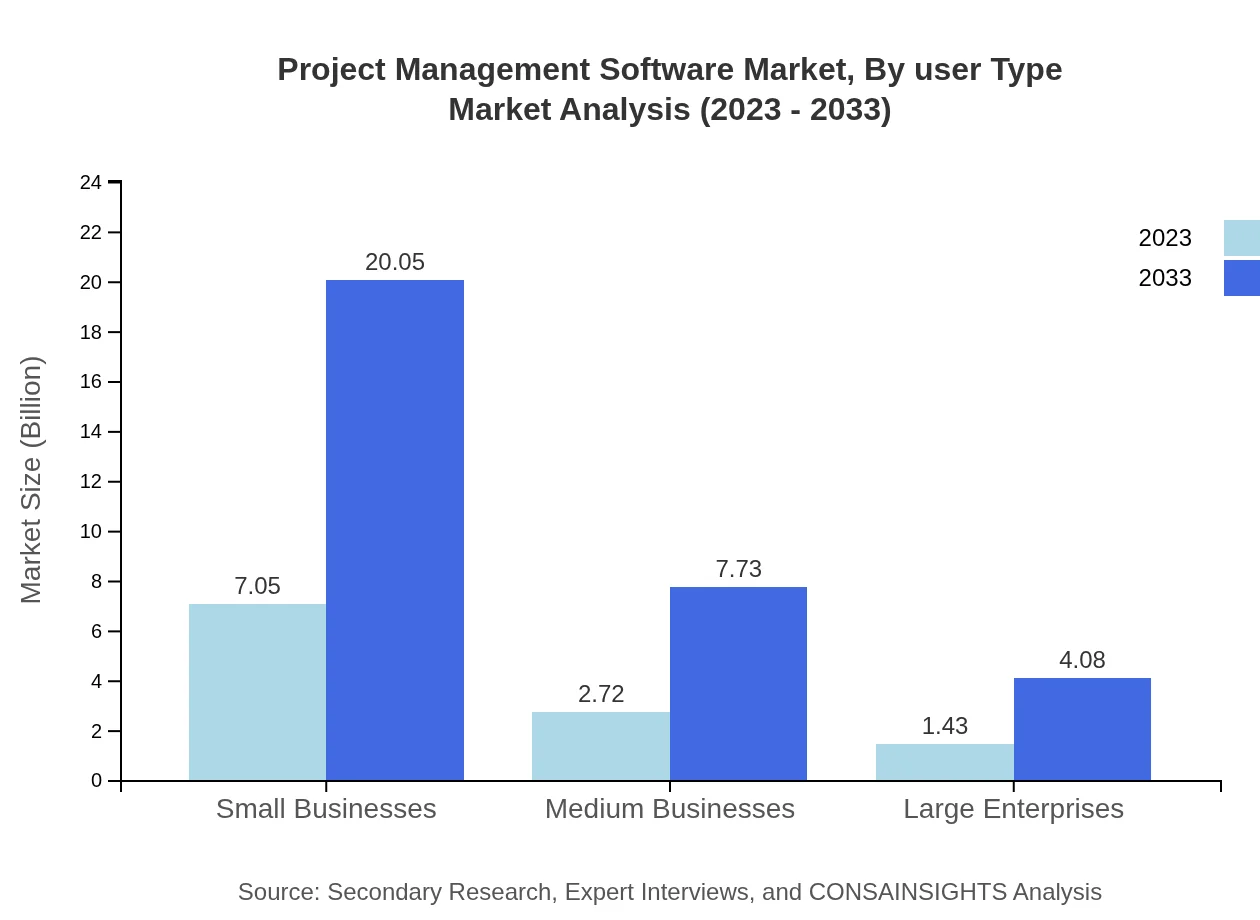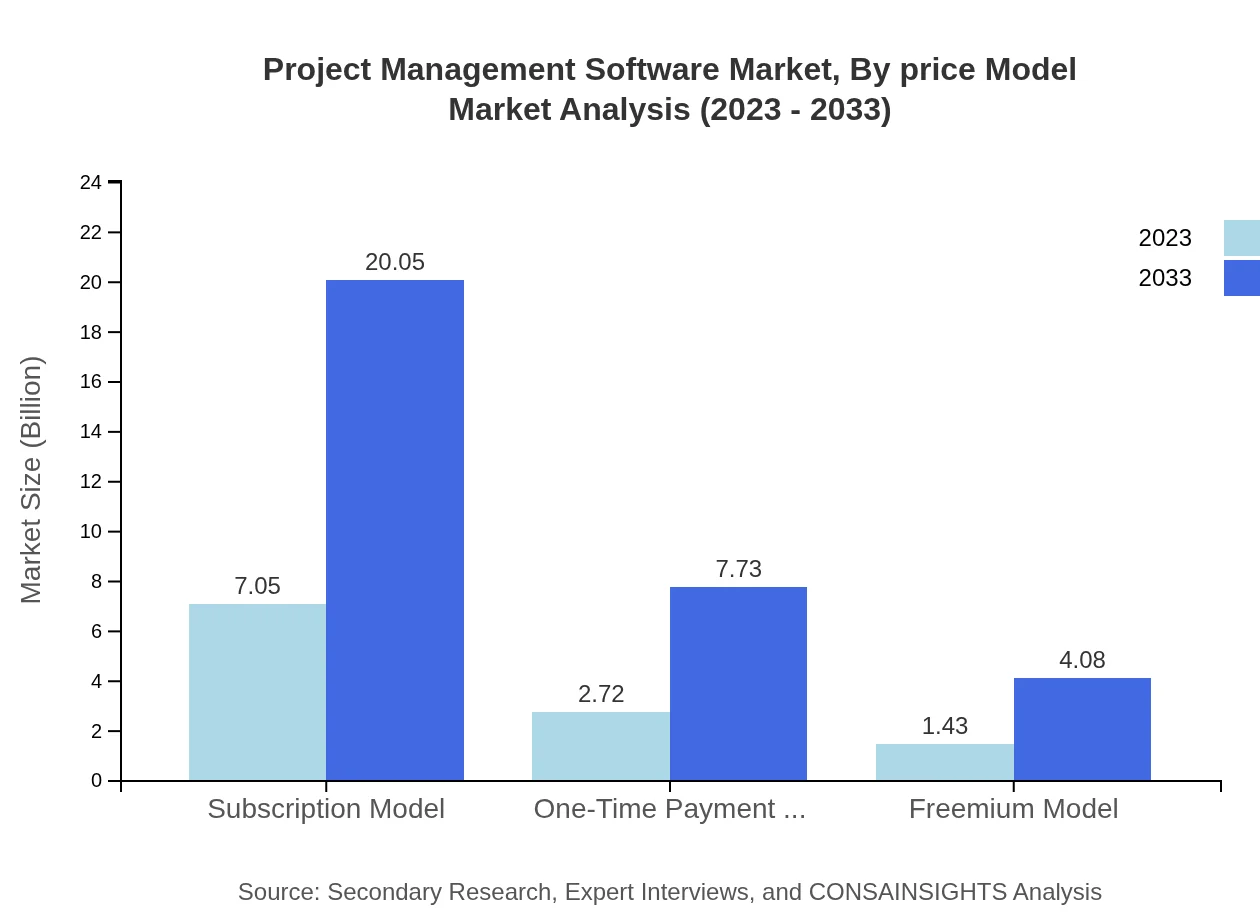Project Management Software Market Report
Published Date: 31 January 2026 | Report Code: project-management-software
Project Management Software Market Size, Share, Industry Trends and Forecast to 2033
This report explores the evolving landscape of the Project Management Software market, analyzing current trends, market sizes, and forecasts from 2023 to 2033. It covers segmentation, regional insights, technological advancements, and profiles of leading companies in the industry.
| Metric | Value |
|---|---|
| Study Period | 2023 - 2033 |
| 2023 Market Size | $11.20 Billion |
| CAGR (2023-2033) | 10.6% |
| 2033 Market Size | $31.86 Billion |
| Top Companies | Asana, Inc., Trello (Atlassian), Microsoft Project, Basecamp |
| Last Modified Date | 31 January 2026 |
Project Management Software Market Overview
Customize Project Management Software Market Report market research report
- ✔ Get in-depth analysis of Project Management Software market size, growth, and forecasts.
- ✔ Understand Project Management Software's regional dynamics and industry-specific trends.
- ✔ Identify potential applications, end-user demand, and growth segments in Project Management Software
What is the Market Size & CAGR of Project Management Software market in 2023?
Project Management Software Industry Analysis
Project Management Software Market Segmentation and Scope
Tell us your focus area and get a customized research report.
Project Management Software Market Analysis Report by Region
Europe Project Management Software Market Report:
The European market is projected to grow from $3.01 billion in 2023 to $8.56 billion by 2033. The increasing complexity of projects across industries necessitates robust management software, creating substantial opportunities in this region.Asia Pacific Project Management Software Market Report:
The Asia Pacific Project Management Software market is expected to grow from $2.22 billion in 2023 to $6.31 billion by 2033, driven by increased digitalization initiatives and the adoption of cloud technologies among SMEs and enterprises in the region.North America Project Management Software Market Report:
North America dominates the Project Management Software market, anticipated to grow from $3.98 billion in 2023 to $11.31 billion by 2033. The region's advanced technological infrastructure and high adoption rates of sophisticated project management tools contribute to its leading position.South America Project Management Software Market Report:
South America displays promising growth, with the market size projected to rise from $0.97 billion in 2023 to $2.75 billion by 2033. This growth is attributed to rising awareness of project management tools among organizations as they strive for operational efficiency.Middle East & Africa Project Management Software Market Report:
The Middle East and Africa market is set to increase from $1.03 billion in 2023 to $2.92 billion by 2033. This growth reflects the region's investments in technology and modernization of project management practices in various sectors.Tell us your focus area and get a customized research report.
Project Management Software Market Analysis By Product
In 2023, the software segment is the largest, valued at $9.77 billion and expected to grow to $27.79 billion by 2033. Services, though smaller at $1.43 billion, also represent an essential component of revenue, forecasting growth to $4.07 billion.
Project Management Software Market Analysis By Industry
The construction industry represents a significant portion of the market, with a size of $6.45 billion in 2023 and expected to increase to $18.34 billion by 2033. IT and healthcare are also notable sectors driving demand, with current sizes of $2.41 billion and $1.18 billion respectively.
Project Management Software Market Analysis By Deployment Model
Subscription-based models are leading, dominating $7.05 billion of the market in 2023 with projections reaching $20.05 billion by 2033. The one-time payment and freemium models, while smaller, are also experiencing growth and serve different user needs.
Project Management Software Market Analysis By User Type
Small businesses account for the largest share at $7.05 billion in 2023, expected to grow to $20.05 billion. Medium and large enterprises also increasingly leverage these solutions, reflecting a broadening acceptance across company sizes.
Project Management Software Market Analysis By Price Model
The price model analysis indicates that subscription options are favored by users for their flexibility, capturing 62.92% share in 2023. One-time payment models remain relevant for businesses preferring traditional purchasing methods and demonstrate steady demand.
Project Management Software Market Trends and Future Forecast
Tell us your focus area and get a customized research report.
Global Market Leaders and Top Companies in Project Management Software Industry
Asana, Inc.:
Asana offers a work management platform designed to help teams orchestrate their work, from daily tasks to strategic initiatives, enhancing project visibility and collaboration.Trello (Atlassian):
Trello helps teams visualize projects and manage tasks effectively through boards, lists, and cards, making it a popular choice for agile project management.Microsoft Project:
Microsoft Project provides comprehensive project and portfolio management software solutions, widely used in larger organizations for resource management and integration within Microsoft Office tools.Basecamp:
Basecamp simplifies project management and team collaboration by offering a central platform for communication, task management, and file sharing.We're grateful to work with incredible clients.









FAQs
What is the market size of project Management Software?
The global project management software market was valued at $11.2 billion in 2023, with a projected compound annual growth rate (CAGR) of 10.6%. This growth indicates robust demand as organizations increasingly adopt these tools for efficient project delivery.
What are the key market players or companies in this project Management Software industry?
Key players include Microsoft, Asana, Trello, Jira, and Smartsheet. These companies dominate the project management software sector through continuous innovation, diverse product offerings, and strategic partnerships that enhance user engagement and functionality.
What are the primary factors driving the growth in the project Management Software industry?
Key growth drivers include increasing project complexities, rising demand for real-time collaboration tools, and the growing trend of remote work. Additionally, advancements in cloud technology and the need for efficient resource management further propel market expansion.
Which region is the fastest Growing in the project Management Software?
The Asia-Pacific region is witnessing the fastest growth in the project management software market, projected to expand from $2.22 billion in 2023 to $6.31 billion by 2033. This surge is attributed to the increasing digitization of businesses in emerging economies.
Does ConsaInsights provide customized market report data for the project Management Software industry?
Yes, ConsaInsights provides customized market report data tailored to specific needs within the project management software industry. This includes segmented data and insights for informed decision-making tailored to various stakeholders in the market.
What deliverables can I expect from this project Management Software market research project?
Deliverables include comprehensive market analysis reports, trend forecasts, competitive landscapes, and segmented insights by region and business size, enabling stakeholders to make informed strategic decisions in the project management software sector.
What are the market trends of project Management Software?
Current trends include a shift towards cloud-based solutions, increased integration of AI and automation tools, and rising adoption among small to medium-sized enterprises. Subscription models are also gaining traction due to their flexibility and cost-effectiveness.

